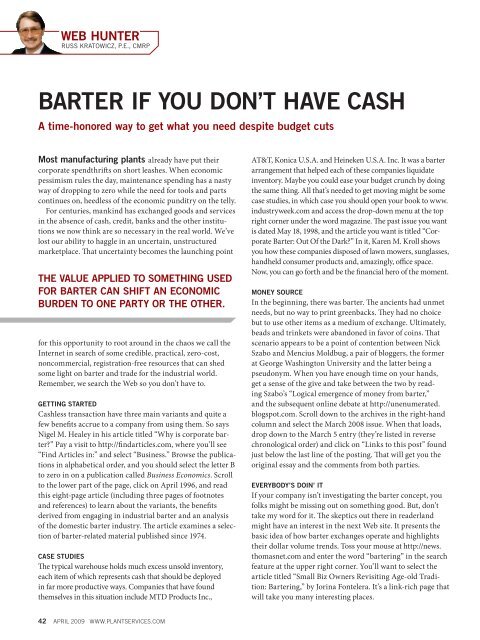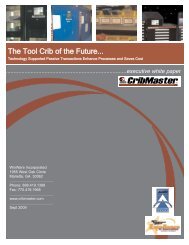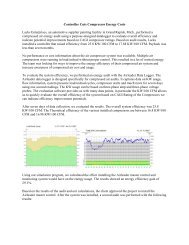POWER UP A WINNER - Plant Services
POWER UP A WINNER - Plant Services
POWER UP A WINNER - Plant Services
Create successful ePaper yourself
Turn your PDF publications into a flip-book with our unique Google optimized e-Paper software.
web hunter<br />
russ Kratowicz, P.E., CMRP<br />
Barter If You Don’t Have Cash<br />
A time-honored way to get what you need despite budget cuts<br />
Most manufacturing plants already have put their<br />
corporate spendthrifts on short leashes. When economic<br />
pessimism rules the day, maintenance spending has a nasty<br />
way of dropping to zero while the need for tools and parts<br />
continues on, heedless of the economic punditry on the telly.<br />
For centuries, mankind has exchanged goods and services<br />
in the absence of cash, credit, banks and the other institutions<br />
we now think are so necessary in the real world. We’ve<br />
lost our ability to haggle in an uncertain, unstructured<br />
marketplace. That uncertainty becomes the launching point<br />
The value applied to sometHIng used<br />
for barter can sHIft an econoMIC<br />
burden to one party or the other.<br />
for this opportunity to root around in the chaos we call the<br />
Internet in search of some credible, practical, zero-cost,<br />
noncommercial, registration-free resources that can shed<br />
some light on barter and trade for the industrial world.<br />
Remember, we search the Web so you don’t have to.<br />
Getting started<br />
Cashless transaction have three main variants and quite a<br />
few benefits accrue to a company from using them. So says<br />
Nigel M. Healey in his article titled “Why is corporate barter”<br />
Pay a visit to http://findarticles.com, where you’ll see<br />
“Find Articles in:” and select “Business.” Browse the publications<br />
in alphabetical order, and you should select the letter B<br />
to zero in on a publication called Business Economics. Scroll<br />
to the lower part of the page, click on April 1996, and read<br />
this eight-page article (including three pages of footnotes<br />
and references) to learn about the variants, the benefits<br />
derived from engaging in industrial barter and an analysis<br />
of the domestic barter industry. The article examines a selection<br />
of barter-related material published since 1974.<br />
Case stuDIes<br />
The typical warehouse holds much excess unsold inventory,<br />
each item of which represents cash that should be deployed<br />
in far more productive ways. Companies that have found<br />
themselves in this situation include MTD Products Inc.,<br />
AT&T, Konica U.S.A. and Heineken U.S.A. Inc. It was a barter<br />
arrangement that helped each of these companies liquidate<br />
inventory. Maybe you could ease your budget crunch by doing<br />
the same thing. All that’s needed to get moving might be some<br />
case studies, in which case you should open your book to www.<br />
industryweek.com and access the drop-down menu at the top<br />
right corner under the word magazine. The past issue you want<br />
is dated May 18, 1998, and the article you want is titled “Corporate<br />
Barter: Out Of the Dark” In it, Karen M. Kroll shows<br />
you how these companies disposed of lawn mowers, sunglasses,<br />
handheld consumer products and, amazingly, office space.<br />
Now, you can go forth and be the financial hero of the moment.<br />
Money source<br />
In the beginning, there was barter. The ancients had unmet<br />
needs, but no way to print greenbacks. They had no choice<br />
but to use other items as a medium of exchange. Ultimately,<br />
beads and trinkets were abandoned in favor of coins. That<br />
scenario appears to be a point of contention between Nick<br />
Szabo and Mencius Moldbug, a pair of bloggers, the former<br />
at George Washington University and the latter being a<br />
pseudonym. When you have enough time on your hands,<br />
get a sense of the give and take between the two by reading<br />
Szabo’s “Logical emergence of money from barter,”<br />
and the subsequent online debate at http://unenumerated.<br />
blogspot.com. Scroll down to the archives in the right-hand<br />
column and select the March 2008 issue. When that loads,<br />
drop down to the March 5 entry (they’re listed in reverse<br />
chronological order) and click on “Links to this post” found<br />
just below the last line of the posting. That will get you the<br />
original essay and the comments from both parties.<br />
EverYBoDY’s doin’ it<br />
If your company isn’t investigating the barter concept, you<br />
folks might be missing out on something good. But, don’t<br />
take my word for it. The skeptics out there in readerland<br />
might have an interest in the next Web site. It presents the<br />
basic idea of how barter exchanges operate and highlights<br />
their dollar volume trends. Toss your mouse at http://news.<br />
thomasnet.com and enter the word “bartering” in the search<br />
feature at the upper right corner. You’ll want to select the<br />
article titled “Small Biz Owners Revisiting Age-old Tradition:<br />
Bartering,” by Jorina Fontelera. It’s a link-rich page that<br />
will take you many interesting places.<br />
42 APRIL 2009 www.PLANTSERVICES.com












